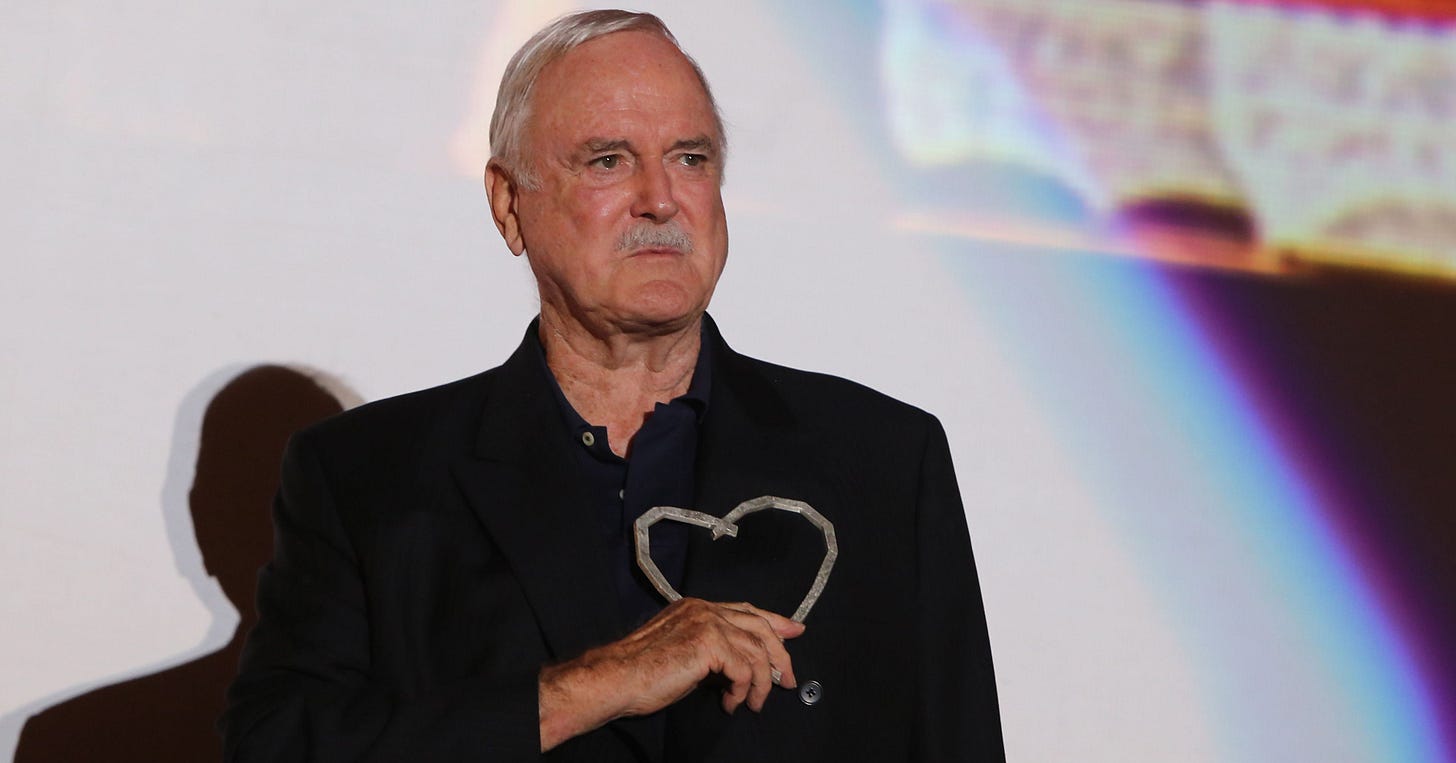E-Pluribus | December 20, 2022
Climate change and . . . "degrowth"?; and now for something completely different - John Cleese; and now for something not so different: part 2 on academic freedom from yesterday.
A round-up of the latest and best writing and musings on the rise of illiberalism in the public discourse:
Jonathan A. Lesser: A Feudal Movement
Language evolves over time, but when a word like “degrowth” emerges, one hopes the evolutionary branch will be a short one. Jonathan Lesser writes for City Journal about climate change and the idea that just refuses to die — that advancing human civilization is incompatible with a sustainable earth.
Electrification and degrowth are actually complementary strategies. The degrowth movement is a Malthusian concept, popularized in 1972 by the Club of Rome publication, The Limits to Growth, which forecast that the world would run out of resources because of exponential population growth. The claims of impending doom, advanced by Paul Ehrlich in The Population Bomb, never materialized. Today, the world is wealthier and far cleaner than it was 50 years ago.
For degrowth proponents, the improvement in global living standards is nothing to celebrate. According to a new article in Nature, degrowth requires developed countries to abandon economic expansion as a goal. It means producing and consuming less, abandoning “less necessary” consumption of fossil fuels, meat and dairy products, cars and air travel, and even “fast fashion.” It means less (or no) private ownership and new ways (read: government control) of “provisioning” individuals to meet their needs.
If all this sounds similar to Marx’s slogan, “from each according to his ability, to each according to his needs,” that’s because it is.
Read it all here.
Nick Gillespie: Cleese on How Wokeness Smothers Creativity
John Cleese has been butting heads with convention for decades. Reason’s Nick Gillespie interviewed Cleese recently and asked him about what obstacles creativity faces today.
[John] Cleese—who studied law at the University of Cambridge—has set his sights on political correctness, which he says is the enemy not only of humor but of creative thinking in all areas of human activity. "There are people sitting there who are deliberately waiting for the thrill of being offended," he says, emphasizing the importance of paying attention to context, without which irony and sarcasm can't be properly understood.
[ . . . ]
[Gillespie]: Let's talk about the enemies of creativity. You've mentioned the educational system that doesn't facilitate it. Wokeism is an issue that you've talked about. How does that stifle creativity?
[Cleese]: Because it's the internal interruption that I was talking about. You think of an idea and you immediately think: "Oooh, is that going to get me into trouble? Well, that person last Thursday got away with it." But all that stuff immediately stops you being creative.
[ . . . ]
[Gillespie]: Wokeism is certainly not the only enemy of creativity. You have talked about the suits, the money people running industries. How do they inhibit creativity?
[Cleese]: Because everything they want is the opposite of what the creative people want. They want clarity. Business people, by and large, are very stressed because they're trying to control everything, especially things that they can't really control. And if you talk to body workers like therapists or physiotherapists or chiropractors or osteopaths or any of these people, they will tell you that the hardest people to work on are business people, because they're trying to control the process even when they're being massaged, whereas the easiest people to work on are the creative people because they're used to just letting things happen without trying to control them. You see, when you're playing with your imagination, you shouldn't be trying to control it. You're just seeing where it takes you because there's no such thing as a mistake.
Read the whole thing.
Jonathan Marks: Rethinking Academic Freedom
Yesterday, we highlighted Penn State University professor Michael Bérubé’s remarks in the first part of an exchange of ideas at Heterodox Academy with Ursinus College professor Jonathan Marks. In today’s highlights, Marks tries to clarify his difference of opinion with Bérubé on what is meant by academic freedom and what is different about Bérubé’s conception of it from its original meaning.
Bérubé and Ruth propose two ways to rethink academic freedom. The first isn’t really a rethinking. According to the traditional understanding of academic freedom, universities serve the common good by housing the “free search for truth and its free exposition.” That service requires wide latitude in research, teaching, and even “extramural” speech — a physicist’s tweets about the Israeli-Palestinian conflict, for example. It requires academic freedom. But academic freedom, Bérubé and Ruth say, isn’t freedom of speech. A professor, charged with teaching a course in calculus, cannot teach Celtic folk music instead. A historian, even if she is tweeting on her own time, can expect to have her professional competence investigated if she indulges in Holocaust denial. A producer of shoddy research should not expect to be tenured or promoted. Few, if any, deny this. But Bérubé and Ruth identify “an excessively libertarian conception of academic freedom” that sets the bar for holding tenured professors to their obligations so high as to render such obligations nearly meaningless. Despite warranted attention to the censoriousness that can take hold of universities, Bérubé and Ruth are right that a live-and-let-live attitude, which conveniently shields all professors from scrutiny, can let consequential professional lapses slide, including those of the occasional white supremacist professor.
I don’t object in principle to the proposal that “elected faculty committees should adjudicate the question of intellectual legitimacy.” Promotion and tenure committees do that, and faculty members, whether elected or appointed by elected faculty committees, should also be involved in post-tenure challenges to a professor’s competence that could result in discipline. Rather, I object to the standard by which Bérubé and Ruth think such committees should operate, which brings us to the second and more controversial rethinking. Such committees should assess “competence” both in “standard disciplinary terms” and in terms of “democratic valence.” To put it another way, in judging, for example, a tenure case, we shouldn’t limit ourselves to whether a social scientist advances the investigation of questions significant for her field in a manner meeting that field’s standards for distinguishing between strong and weak arguments. We should look also to whether her work reflects a commitment to “furthering democracy.”
That’s novel, not because it sees a connection between scholarship and democracy but because it reconceives that connection. Since the American Association of University Professors first articulated its understanding of academic freedom in 1915, that understanding supposed that democracies needed an “intellectual experiment station” that considered, rigorously, ideas that might be “distasteful to the community.” We scholars have relied on that justification when the public, or trustees, or our colleagues have demanded that universities serve democracy more directly, by purging its ranks of antiwar or Communist professors, for example. . .
Read it all.
Around Twitter
In the wake of the Twitter Files, Glenn Greenwald with a reminder that Twitter was not alone in its censorship of the New York Post:
Aaron Rupar was recently suspended and then reinstated by Twitter after the recent controversy over “real-time locations” and “doxxing” for Elon Musk. Afterwards, Rupar made what he apparently believes is a new phenomenon:
And finally, sure, it’s propaganda, but how effective can this message possibly be? Has Russia lost its touch?










